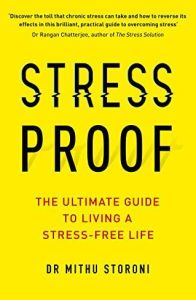Join getAbstract to access the summary!

Join getAbstract to access the summary!
Mithu Storoni
Stress-Proof
The Ultimate Guide to Living a Stress-Free Life
TarcherPerigee, 2019
What's inside?
To avoid chronic stress, don’t sweat the small stuff.
Recommendation
Chronic stress can depress you, blow up your blood pressure and lead to heart disease. Physician and neuroscientist Mithu Storoni discusses the dangers of chronic stress and explains how to defuse it. To begin, she says, a positive mind-set can ward off the negative effects of stress. She offers enlightening, concrete suggestions about diet, exercise, behavior and lifestyle changes to help eliminate chronic stress and improve your physical, emotional and mental health.
Summary
About the Author
Mithu Storoni is a physician trained in ophthalmic surgery and neuroscientific researcher. She holds a PhD in neuro-ophthalmology and conducted her research in that field at the National Hospital for Neurology and Neurosurgery in London.



















Comment on this summary